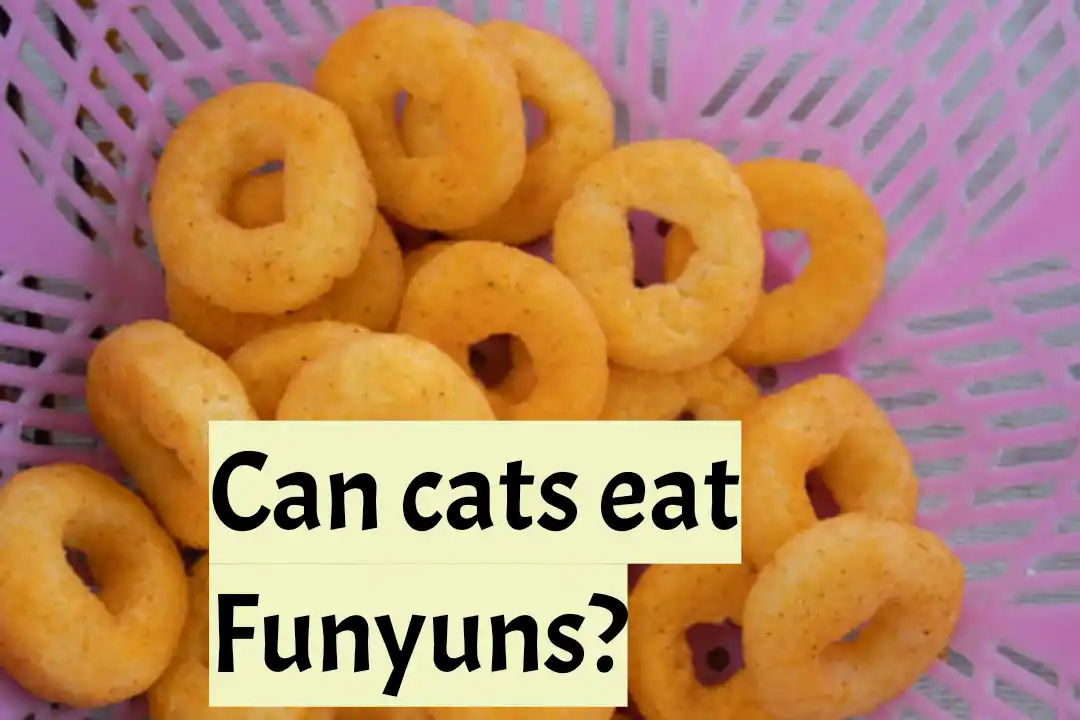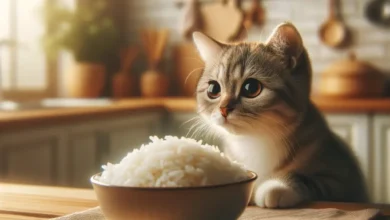Can Cats Eat Funyuns? Discover 7 Ingredients That Impact Your Cat

That distinct salty onion taste layered in each crunchy funyuns chip makes them so irresistible for me as a human. You could be eating some funyuns, and your cat is looking at you to hand it; before giving them some, you will want to read this piece first. Lots of snacks contain spices, and funyuns are part of them. So, can cats eat funyuns?
Can cats eat funyuns? No, cats should not eat funyuns because these onions flavored fun snacks have high salt and fat content, and it has no nutritional benefit for cats. The unhealthy combination of high salt levels, fat and high-fat content in funyuns makes it a dangerous treat to feed your cat. Serving your cat a few pieces of funyuns will surpass your feline friends’ daily fat and salt intake. It is best to meet funyuns away from cats.
Funyuns for cats is a recipe for an endless list of health issues. If you have been wondering if your cat can eat funyuns, it’s time to eliminate that thought. In this article, we will explore funyuns—detailing the health risk it poses to your cat and why you shouldn’t let your cat have some funyuns.
Table of Contents
- What are funyuns?
- Are funyuns toxic to cats?
- Can Cats have Funyuns?
- Is it safe for cats to eat funyuns?
- What should I do if my cat ate funyuns?
- Can cats eat funyuns? – final thoughts
What are funyuns?
Funyuns, made by a company called Frito-lay, describes funyuns as “a delicious, unique snack, with a crisp texture, fun to eat and flavored in onions,” with an introduction to the united states dating as far back as 1969. Funyuns consist majorly of cornmeal, while they get their flavor from an onion and salt mix.
Funyuns are produced through an extrusion process, mixing the cornmeal into a paste with water. The resulting paste is then kneaded and heated to a certain degree by the extrusion machine. The paste is made into onion rings and fried when this process is over.
Are funyuns toxic to cats?
Yes, but in large amounts. One or two rings of funyuns will not kill your cat, but if eaten in large quantities, the high salt, sugar, and fat content will significantly impact their health.
Also, the flavoring compound in funyuns consists of onions and garlic. Onion powder is more toxic when compared with fresh onions—because of its concentration level. When feeding your feline friend funyuns, you deliberately expose them to health issues. Here is a list of what cats eat.
Can Cats have Funyuns?
No, your cat should never be allowed to have funyuns. Funyuns are packed with salt, which increases the risk of sodium poisoning, and they are also flavored with onions. Onions cause hemolytic anemia in cats, where the amount of oxygen transported around your cat’s body diminishes drastically due to the destruction of its red blood cells.
The onion content may not be enough to cause adverse effects if you give little to your cat, but giving your cat so many funyuns can trigger toxic or allergic reactions. If a treat is not healthy or beneficial to your cat, why give it? To what end?
Funyuns Ingredients List and How They Impact Your Cat
- Enriched corn meal
- Vegetable oil
- Salt
- Msg
- Sugar
- Onions and garlic
Enriched corn meal
Funyuns’ main ingredient, enriched corn meal, is usually gotten from the dent class corn. Many processed snacks use dent corn because its starch is soft, making it easy for them to mill. Besides its soft starch, the dent class of corn has a powerful corn flavor, which makes it the best choice for making funyuns and snacks alike.
While processing the carb meal, many nutritious brans are lost, and germs are eliminated. To restore lost nutrition to the cornmeal, Folic acid(B9), Riboflavin, Niacin, Iron, and Thiamin mononitrate are added—this is why it’s called an “Enriched” corn meal. When we use the term “enriched” for wheat flour or corn, we are depicting that the nutritious parts of the corn meal or wheat flour were lost while they were being processed.
If your feline friend is allergic to corn products, keep funyuns away from them. If you’re unsure, contact your vet to discover if your fur buddy has corn allergies. If you must give your cat these chips, one or two is enough and should be an occasional treat.
Some Cats may Be Allergic to Vegetable Oils Used In Making Funyuns
The vegetable oils primarily used in Funyuns are canola oil, corn oil, and sunflower oil. Of these three oils, the most healthy for cats is sunflower oil.
Sunflower enriches your pet with omega-3 and omega-6 fatty acids, pivotal in keeping their skin clear, moisturized, and shiny. This sunflower oil aids healthy hearts in felines; it also provides a boost of energy.
Corn oil is an excellent fat source for cats. The polyunsaturated fat in corn oil aids a moisturized coat and skin. Adding a spoonful of corn oil to your kitty’s food is safe. However, some cats have allergies to corn oil; if your furry friend is in this category, avoid feeding them Funyuns. Here are some other oils you could use if your fur buddy is allergic.
Fish oil is rich in omega-3 fatty acids, which is a great deal if you care about your cats’ skin and coat; it’ll also benefit the heart. For cats, fish oils are one of the best oils.
Safflower oil has a rich deposit of essential fatty acids such as linoleic acid; like fish oil, it helps make your cat’s skin and coat shiny and healthy. But it contains high amounts of calories and should be used sparingly to avoid excessive weight gain in your cat.
Coconut oil aids with digestion issues in cats. Also, for cats with dry, flaky, and itchy skin, coconut oil helps resolve these issues. Coconut also boosts your kitty’s immune system and helps with bad breath And dermatitis. According to Dr. Jeffrey Stupine, VMD, head veterinarian for wellness at the Pennsylvania SPCA
Flaxseed oil aids proper kidney function and blood pressure in cats. For cats allergic to fish oil, flaxseed oil is a suitable alternative. It suppresses inflammation in cats.
Read- baby aspirin for felines.
Olive oil is considered a ” superfood,” It is just as healthy for your feline friend as it’s beneficial for us humans. The most significant cause of allergy in cats is fish. So, if your domestic cat reacts to fish oil, you could easily switch to olive oil.
Too much salt is harmful to cats
A serving of 13 pieces of Funyuns contains 280mg of salt! Which is way too much salt for cats. Cats only require 1 gram of salt per kilogram of body weight each day.
Eating up to 13 chips of Funyuns could cause sodium poisoning in cats; it could also lead to stress in cats. Symptoms of sodium poisoning include:
- Vomiting
- Diarrhea
- Lethargy
- Loss of appetite
- Kidney failure
- Muscle tremors
- Dehydration
- Frequent urination
If your cat consumes a serving of Funyuns, make plenty of water available, as dehydration will likely strike. Reach your vet and ask if your cat should come over for proper examinations. Instead of funyuns, fruits such as Guava and Watermelon will suffice.
Sugar Can Lead To Feline Obesity And Other Health Issues
Sugar may not pose an instant threat to your cat’s life, but it will cause harm in the long run. A cat’s daily diet should not have more than 3% sugar. A serving of funyuns contains slightly less than 1 gram of sugar which is more than your cat should have.
Your cat doesn’t have sugar and has no need for them; loading your fur buddy with so much sugar will lead to obesity and diabetes over time—it could also lead to tooth decay in cats.
Monosodium glutamate (MSG) is toxic to cats
Funyuns snacks contain a flavor enhancer called Monosodium glutamate. In some studies, MSG has been linked to brain damage and liver and kidney failure in animals.
If your kitty eats funyuns and you notice a lack of coordination or upset stomach—contact your vet. for the upset stomach, you can use 10mg of Pepcid; this will help calm the upset. Additionally, a little bit of Pedialyte will help your kitty stay hydrated. A bland diet such as chickens could also help.
Cats’ reactions to MSG will be individual and different; this is why you should consult your vet about any signs you notice after your kitty consumes funyuns.
Onion powder and Garlic powder Are Both Toxic to Cats
Onions and Garlic in raw, fried, powdered, or cooked forms can cause adverse effects in cats. The entire onion and garlic plant parts are toxic to cats, including their powdered form, which is used in funyuns.
The percentage of onion and garlic powder (2%) in funyuns means that your kitty won’t experience the onion and garlic adverse effects from 1 serving. It may take over ten servings of funyuns for onion toxicity to occur in cats, but we still don’t recommend you give your cat some funyuns.
There is also the scenario of your cat being likely to react to small portions of onion powders; cats are different, and so is their dynamism in reaction to toxicity.
Since both onion and garlic are part of the allium family, consumption of small amounts of onions and garlic could trigger severe medical applications.
Is it safe for cats to eat funyuns?
No, it isn’t safe for your cats to eat funyuns. One or two chips may not cause harm to your kitty, but continuous use or feeding them much at a go could lead to some long-term disease.
The onion content in funyuns is insignificant and will not harm your cat, even if they are a bag of funyuns. However, the threat of high salt and fat content is still very much present. These snacks don’t contain animal-based proteins or essential amino acids like taurine. So, why give your cat some?
What should I do if my cat ate funyuns?
If your cat ate funyuns, you must first relax—don’t panic. Observe your cat for signs and symptoms of sodium poisoning and report to your vet exactly what you have noticed.
In most cases, your kitty will resolve issues that may arise from eating funyuns by himself. However, if your cat has a corn allergy, one or two chips could trigger these reactions. The vet always performs an IV fluid flush in cases like this.
Can cats eat funyuns? – final thoughts
Of course not! As loving, caring, and responsible cat owners, we should always want the best for our cats, and this includes making sure they don’t eat harmful substances and only eat nutritionally beneficial foods.
Cats somehow know how to avoid certain foods that are not appealing to them, but they could equally pick up odd tastes in nutrition; this is where you come in; if you can, ensure your kitty never eats funyuns. Funyuns have high salt and fats; your cat needs only half a serving, and his daily salt intake will be exceeded.
Next time you’re tempted to feed your cat funyuns, consider all you’ve read here.



